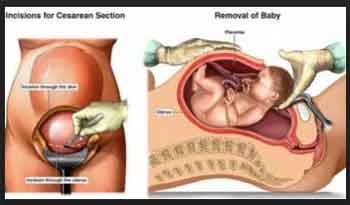- Home
- Editorial
- News
- Practice Guidelines
- Anesthesiology Guidelines
- Cancer Guidelines
- Cardiac Sciences Guidelines
- Critical Care Guidelines
- Dentistry Guidelines
- Dermatology Guidelines
- Diabetes and Endo Guidelines
- Diagnostics Guidelines
- ENT Guidelines
- Featured Practice Guidelines
- Gastroenterology Guidelines
- Geriatrics Guidelines
- Medicine Guidelines
- Nephrology Guidelines
- Neurosciences Guidelines
- Obs and Gynae Guidelines
- Ophthalmology Guidelines
- Orthopaedics Guidelines
- Paediatrics Guidelines
- Psychiatry Guidelines
- Pulmonology Guidelines
- Radiology Guidelines
- Surgery Guidelines
- Urology Guidelines
Induction of labor at 39 weeks reduces need for cesarean birth

The results of ARRIVE TRIAL presented at the annual meeting of Society for Maternal-Fetal Medicine's (SMFM) have demonstrated that induction of labor at 39 weeks of gestation among healthy, first-time mothers reduces the rate of cesarean birth as compared to expectant management among the same population. It is a known fact that worldwide there has been upsurge in cesarean deliveries, which may be necessary under certain circumstances.But at the same time they also carry with them certain risks which include an increased likelihood of infection, hysterectomy, placenta implantation abnormalities in future pregnancies, and respiratory illness in infants.
In a study with more than 6,100 pregnant women across the country, researchers randomly assigned half of the women to an expectant management group (waiting for labor to begin on its own and intervening only if problems occur) and the other half to a group that would undergo an elective induction (inducing labor without a medical reason) at 39 weeks of gestation. Results include:
- Lower rates of cesarean birth among the elective induction group (19%) as compared to the expectant management group (22%)
- Lower rates of preeclampsia and gestational hypertension in the elective induction group (9%) as compared to the expectant management group (14%)
- Lower rates of respiratory support among newborns in the induction group (3%) as compared to the expectant management group (4%)
"Safe reduction of the primary cesarean is an important strategy in improving birth outcomes," said William Grobman, MD, MBA, who presented today's findings and is professor in obstetrics and gynecology at Northwestern University's Feinberg School of Medicine. The research presented is part of, "A Randomized Trial of Induction Versus Expectant Management," more commonly referred to as the ARRIVE Trial, which was funded by the Eunice Kennedy Shriver National Institute of Child Health and Human Development (NICHD).
SMFM's current guidelines do not recommend routine induction of labor for low-risk pregnant women at 39 weeks of gestation. "SMFM will wait to evaluate the peer-reviewed publication of the ARRIVE Trial before providing any guidance or changes to our existing recommendations," said Alfred Abuhamad, MD, the President of SMFM.

Disclaimer: This site is primarily intended for healthcare professionals. Any content/information on this website does not replace the advice of medical and/or health professionals and should not be construed as medical/diagnostic advice/endorsement or prescription. Use of this site is subject to our terms of use, privacy policy, advertisement policy. © 2020 Minerva Medical Treatment Pvt Ltd